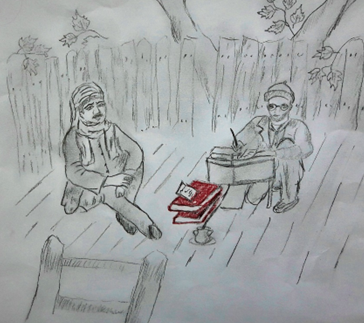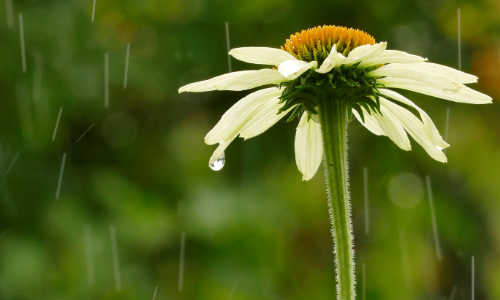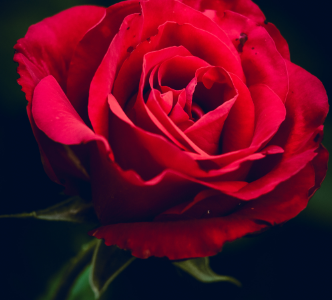Even if it appears to be a coercive force,
sometimes the name becomes exile for migration, sometimes just migration,
but this is clearly a Divine urging.
Barla was where the colors of the sky reflected in the lake. It was where the eloquence of the era met the humanity of sincerity on the horizon of devotion. A place of warm affection, of genuine solidarity…
The Gelincik Mountains acted as a shield against potential storms, while the tranquility of the Eğirdir Lake provided serenity and well-being to the people of Barla. Here, as people breathed in their accustomed peace, rumors circulated of a learned scholar banished from the East who had been brought to the town but was not allowed to meet anyone. This scholar’s name was Bediüzzaman; he had been a guest in the home of Muhajir Hafiz Ahmet and Emine Hanım for a while before being settled in a house adjacent to the Yokuşbaşı Mosque.
Since his arrival in Barla, the south wind from the Eğirdir Lake blew differently, like a determined fugitive, rustling and moving my leaves. They had built a wooden pavilion amidst my branches, a place from which the Eğirdir Lake and Barla could be viewed and contemplated from above. Here, especially during the early hours of dawn, his supplications seemed to elevate the entire universe. The flapping of wings, the gentle murmur of Yokuşbaşı Fountain, the angels in the sky and the fish in the lake—all accompanied his invocations and recitations.
During this time, Hafiz Tevfik, who had been appointed as the muezzin of the grand mosque, learned that a great scholar had come to Barla. The Divine urging that prompts a bird to return to its nest before the storm arrives was now urging Hafiz Tevfik to meet Bediüzzaman as soon as possible. However, Hafiz Tevfik was a cautious man, so their meeting was delayed by about a year. When they first met, he recognized that countenance. It had been years ago, all the way back in Damascus, in the Umayyad Mosque…
Once, he had visited the mosque with its imam to see him. Tevfik carefully observed his surroundings and Bediüzzaman. Pleasant fragrances permeated the air, and the room seemed to emit a heavenly aroma. A Qur’anic manuscript was hanging on the wall in a gold-embroidered bag. There were no other books in sight. The scholars he knew typically had extensive libraries. This man, however, seemed like he would disrupt the norm. They both settled in the pavilion amongst my branches. Bediüzzaman offered his guests tea. The imam was aware that he was in the presence of an ocean of knowledge.
“How can we make him speak?” they wondered.
“Let’s ask him a question.”
“Yes, that would be fitting.”
“Should we ask whether the Prophet, peace and blessing be upon him, went on the Ascension physically or spiritually?”
“Yes, that’s a good question.”
“Scholars have different opinions. Could the Ascension have been physical, or was it spiritual?” they inquired.
“Brother Hafiz, do you have paper and pen?” he said.
Hafiz Tevfik, recalling his father’s words from years ago in the Umayyad Mosque, “Take good care of this person, my son. This man is a contemporary sage. In the future, God willing, you will serve him,” felt that the time for his duty might have come.
“Yes, I’m a good writer,” he said joyfully. It seemed that the time had indeed come.
“Well then, take this notebook!”
With his gaze fixed far beyond, beyond the mountains of Gelendost. His forehead had started to perspire.
“Write, my brother!” the scholar said first.
Words flowed from his mouth like cascading waterfalls. And then, the Divine inspirations from the Qur’an that came to his heart. First, they discussed the parties involved in the issue of the Ascension, then the realities of the Ascension mentioned in the Isra and An-Najm chapters.
After a while, he stopped and said, “I’ve got it, I’ve got it all. I’ve captured it.” Thus, they began writing about the necessity, truth, wisdom, and outcome of the Ascension in four fundamental principles, addressing any possible questions.
How fortunate I am, my branches and leaves, to witness the budding of these writings that decode the mysteries of faith.
Bediüzzaman spoke rapidly, and Tevfik transcribed swiftly. At one point, the scholar looked at what had been written and said, “Your writing is beautiful!”
“You are needed by me, but I’m somewhat irritable. I can’t get along with everyone; you need to be cautious.”
“Sir, I am a smoker. What should we do?”
“In that case, let’s make an ‘Albanian oath.’ When I get angry, you don’t say anything. When you get angry, you go and chase away the flies.”
They both smiled in agreement, signifying confirmation.
“Write, my brother!” the scholar said again.
“Just as Divine Wisdom makes the body accompany the spirit in Paradise, because the body enables numerous duties of worship to be performed and innumerable pleasures and pains to be experienced, it also is pure wisdom that He would make Muhammad’s blessed body accompany his spirit in ascending to the Lotetree of the furthest limit, the “trunk” of the Garden of Refuge and Dwelling.”[1]
Then, he said, “The veil has come down, my friend.”
With a voice that released serenity into the enchanted atmosphere, he called out, “My friend, Hafiz Tevfik!”
“Here, sir.”
“I solemnly swear that even if an invitation came to me from Paradise right now, I would not go without taking Tevfik with me.” And with that, he completed his sentence.[2]
In the shade of the plane tree in Barla, with the wisdom on his lips and the grace in his soul, Bediüzzaman spoke, while Hafiz Tevfik from Damascus, whose name was written as “chief scribe” in the notebook, transcribed the words.
[1] Bediüzzaman Said Nursi, The Words, New Jersey: The Light, 2013, p. 590–591.
[2] Necmeddin Şahiner, Son Şahitler Bediüzzaman Said Nursi’yi Anlatıyor, 4. cilt, İstanbul: Nesil Yayınları, 2008.




